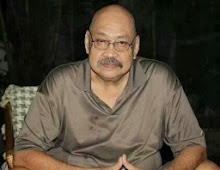GARY KASPAROV and Ignatius Leong are both banned for a period of two years from holding any office or position within FIDE, including its member federations, continental associations or any other affiliated international organisations, as well as participating in any FIDE meeting as delegate, proxy-holder or other representative of a FIDE member,” read the statement published on the Fide website.
This ban is effective from Oct. 21 until Oct. 20, 2017.
The Ethics Commission, at the FIDE Congress in Abu Dhabi, earlier said that Kasparov and Leong were found guilty of breaching the Fide Code of ethics for their conduct during the 2014 Fide presidential elections.
Kirsan Ilyumzhinov is a controversial figure for claiming that he was abducted by aliens in 1997 in a flying saucer and taken to a distant planet. I believe this story on his abduction though being a member of the Philippine Astronomical Society and a firm believer of intelligent aliens, some of whom are billions of years more advanced..
I have been a close observer of chess for a long time. My estimate is that Kirsan has spent over $50 million of his personal money on chess and that’s a lot of loves and of course there’s a saying, “Don’t fix it if it ain’t broken!”
Before last year’s presidential poll, Kasparov, bidding for the office, and then General Secretary Ignatius Leong made a deal in which Kasparov paid Leong $500,000.
Leong promised Kasparov that he would get ten plus one votes of Asian chess federations for the $500,000. One of those who voted for Kasparov was Philippines’ Prospero Pichay who was in turn promised the presidency of the Asian Chess Federation.
The Kasparov Chess Foundation and Leong’s company, Asian Chess Academy, were also supposed to establish a new organization, Kasparov Chess Foundation Asia, which was supposed to transfer $1 million to Leong’s firm in case of Kasparov’s victory.
The FIDE Ethics Commission consists of Francois Strydom of South Africa (Chairman), Ion-Serban Dobronauteanu (Romania), Pedro Dominguez Brito (Dominican Republic), Willy Iclicki (Liechtenstein) and Rajesh Hari Joshi (Nepal).
According to the Kasparov team though, the $500,000 would not be granted to Leong personally but to the Kasparov Chess Foundation Asia for “promoting and encouraging the study and play of chess in East Asia, Southeast Asia and the Pacific Region, as a means of intellectual development.”
Milo. Cleo Ilaras (cleo.ilars@gmail.com) sent me this report: “The University of San Carlos chess team, dominated the 2015 Milo Little Olympics National Finals in Laguna last Oct 23-25.
The USC Secondary Boys tallied a total of 8.5 points in the round robin format event and took the top spot, while the Lady Warriors marched to their victory in the secondary girls division with 7.5 points.
The USC team elementary girls and boys also won their events. The secondary boys team is composed of Andrew Balbona, Ryan Pacres,Jeffu Dorog, Arvert Cadiz, Justin Bajo, Kirk Morala and Andrie Cadiz, while the members of the girls team are Jeremy Bajo, Laila Nadera, Glysen Derotas and Cherry Caballes. The members of the elementary boys team are Dwayne Abella, Raniel Perandos, Jave Peteros, Gyles Derotas, and Justin Joseph, and the members of the elementary girls team are Krisen Sanchez, Angel Bagano, Jasia Dorog and Althea Bagano.
Perandos, Bagano, Dorog and Nadera received the Most Outstanding Athletes (MOA) award and got P10,000 and a one-year supply of Milo.
